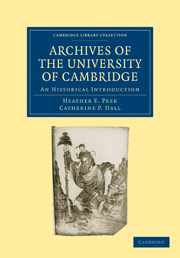Book contents
- Frontmatter
- Contents
- List of Plates
- Preface
- PART I
- PART II
- 4 The University and Colleges as Privileged Corporations
- 5 Records of University Administration
- 6 Records of Matriculation and Degrees
- 7 Financial Records of the University
- 8 Endowments of the University
- 9 University Officers and their Records
- 10 Records of the University Courts
- 11 Records of University Jurisdiction in the Town of Cambridge
- 12 The Relations between the Crown and the University
- 13 Other University Institutions and their Records
- APPENDICES
- Index
- Index to Muniments of Title in Appendix B
- Plate section
7 - Financial Records of the University
Published online by Cambridge University Press: 07 September 2010
- Frontmatter
- Contents
- List of Plates
- Preface
- PART I
- PART II
- 4 The University and Colleges as Privileged Corporations
- 5 Records of University Administration
- 6 Records of Matriculation and Degrees
- 7 Financial Records of the University
- 8 Endowments of the University
- 9 University Officers and their Records
- 10 Records of the University Courts
- 11 Records of University Jurisdiction in the Town of Cambridge
- 12 The Relations between the Crown and the University
- 13 Other University Institutions and their Records
- APPENDICES
- Index
- Index to Muniments of Title in Appendix B
- Plate section
Summary
Under the medieval constitution, the proctors had been the most important administrative officers in the university and, as such, were responsible for finance. By the statute of 1570, many of the proctorial functions, including financial control, were transferred either to the chancellor or to the vice-chancellor, and the office thus lost much of its ancient importance. The first statement of the university's financial position in medieval times is found in a series of Proctors’ Indentures, the earliest of which is dated 1363. As has been stated in an earlier chapter (chapter 5), Grace Books A and B both contain detailed financial and other records, dating from 1454 to 1500. After the latter date, annual financial records only were kept in Grace Book B and, after 1544, a separate series of Audit Books came into existence. The accounts in these early Grace Books are very varied in their content and scope, and do not follow any particular arrangement. Outgoings and receipts, cautions, accounts of certain benefactions and tables of degrees are grouped together in rather a haphazard way.
The financial records of this period are of immense interest, shedding fresh light on historical events, and on the part played by the university in religious and political matters. This is especially true of the accounts of the Reformation period, showing as they do ‘the University treating on the one part with Henry VIII, Wolsey and Cromwell, and, on the other with enraged and excommunicated Mayors and bailiffs”.
- Type
- Chapter
- Information
- Archives of the University of CambridgeAn Historical Introduction, pp. 34 - 37Publisher: Cambridge University PressPrint publication year: 1963First published in: 1962



